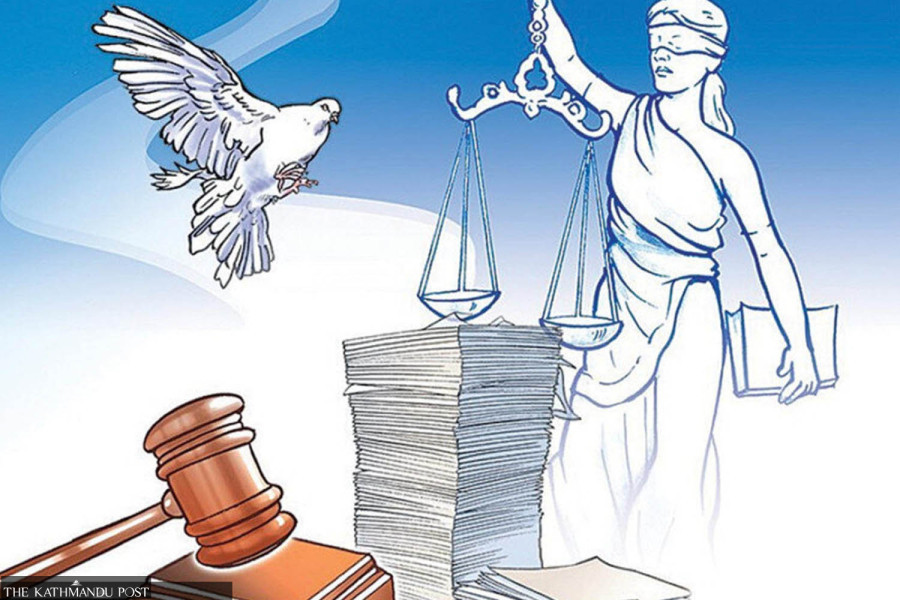National
156 vie for positions in two transitional justice commissions
Conflict victims, human rights activists have demanded mandatory public hearings of shortlisted candidates.
Binod Ghimire
Over 150 individuals have applied to the committee tasked with nominating office bearers for the two transitional justice commissions as the extended deadline ended on Tuesday afternoon.
As many 156 persons including retired judges, legal experts and rights defenders, as well as the victims of the decade-long Maoist insurgency, applied for the positions of chairpersons and members of the Truth and Reconciliation Commission and the Commission of Investigation on Enforced Disappeared Persons.
Some former officer bearers of the two commissions, whose tenure were not extended for their failure to discharge the assigned duties, have also applied for reappointment.
The initial application deadline that ended on November 14 was extended by five days, until Sunday, following demands by a group of human rights activists. “We have received applications from very qualified and competent individuals. They either have applied individually or have been nominated by organisations,” Khamma Khati, spokesperson of the recommendation committee, told the Post. “We will publish the list of applicants on Wednesday.”
The selection committee has set three modalities for application. While individual aspirants can directly apply for any of the positions, different human rights and victims’ organisations can also make nominations at the organisational level. Such institutions, however, need the consent of the individuals they are nominating.
Khati said they will verify whether applicants meet the criteria and the organisational nominations have the consent of the individuals before publishing the names of the aspirants for the 10 positions. “We will also collect some names on our own before publishing the short list of office bearers,” said Khati.
The provision of organisational nominations and selection by the committee itself was included as renowned figures might hesitate to apply for positions in the commissions.
As per the record at the selection committee’s secretariat at the Ministry of Law, Justice and Parliamentary Affairs, 81 individuals presented physical applications and 20 through emails. While additional 20 individuals have been nominated by various organisations in consent with the individuals, 27 others have been nominated without their consent. Among them, 31 have applied for the two positions of chairpersons.
Officials at the ministry say two former Supreme Court justices, 14 retired high court judges, former members of the National Human Rights Commissions, professors, former bureaucrats, renowned human rights activists and the conflict victims also have applied either for chairpersons or members or both.
This is the first time those victimised either by the state or by the erstwhile Maoist rebels are contesting to lead the commissions formed to investigate the cases of atrocities from the decade-long insurgency.
As per its working procedure, the committee will collect public feedback, ask the candidates to make presentations and carry out other necessary tasks before selecting them for appointment.
The stakeholders, however, claim that presentations and public feedback are insufficient. The victims of the 1996-2006 conflict and human rights activists have demanded mandatory public hearings of shortlisted candidates before making the nominations.
The two commissions have been defunct since July 2022, when the government extended their terms without retaining their chairmen and members. The government claimed the bill to amend the transitional justice law would be endorsed by October 2022, and the appointments would be made based on the revised Act.
However, the federal parliament took more than two years to endorse the bill. The victims and human rights defenders are now closely watching who will be appointed to the commissions.
The amended Act sets four-year terms for the two transitional justice commissions to investigate the cases and recommend prosecution and reparation. However, if they fail to accomplish their tasks within the given time, they may be granted a term extension.
The truth commission has received 63,718 complaints, while the commission on disappearances is sitting on around 2,400 cases. As the recent amendment to the Act has included a provision to allocate additional three months to collect the applications, the number will further increase.
The commissions, first formed in 2015, have done little beyond collecting complaints and conducting preliminary investigations on some cases. The to-be-formed commissions will be the third to be constituted in a decade.




 13.12°C Kathmandu
13.12°C Kathmandu














